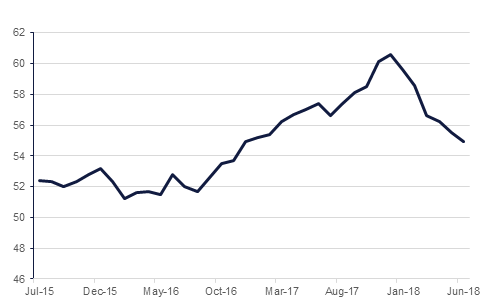
The US ISM Manufacturing Index came in at 60.2 in June, exceeding expectations of 58.5, and the previous month’s 58.7. This was the second-highest reading since 2004, reflecting the ongoing robustness of the US economy, despite the looming threats from various trade spats being pursued by the administration of President Donald Trump. Anecdotal reports contained within the survey did cite nascent disruption and higher input prices, but these were offset by lower oil prices last month. Supplier deliveries was a key driver of the strong headline figure, as it jumped from 62.0 to 68.2, the second-highest figure since 1979.
Eurozone PMI fell to an 18-month low of 54.9 in June, down from 55.5 in May – albeit still well above the neutral 50.0 level which delineates contraction and expansion. New orders weakened, suggesting that output will remain under pressure in the coming months. The IHS Markit survey returned anecdotal concerns over trade wars and rising tariffs. Unemployment stood at 8.4% in June. Within the Eurozone, France’s PMI was at 52.5 in June, missing expectations of 53.1 (in line with May’s reading). Some positive news for Eurozone stability came from Germany yesterday, where Chancellor Angela Merkel has managed to forge an agreement with junior coalition partner, the Bavarian CSU, whose interior minister Horst Seehofer had been threatening rebellion over immigration policies. The deal will see holding centres for some refugees established at the German border.
UK PMI data was also released yesterday, coming in at 54.4 in June, compared to 54.3 the previous month, and exceeding expectations of 54.0. Firms here were also concerned over tariffs, in addition to the currency and Brexit, and business optimism has fallen to a seven-month low. British business is becoming increasingly frustrated with the government, with the British Chambers of Commerce calling for ‘urgent clarity on the practical, detailed issues’ of trade, as firms are at ‘breaking point.’ Prime Minister Theresa May has scheduled a day’s summit with all cabinet members on Friday in order to thrash out agreement on the white paper which will be presented to the EU next week.

Treasuries pared early session gains as equities stabilized towards the latter part of the trading session. Yield on the 2y UST, 5y UST and 10y UST closed at 2.54% (+2 bps), 2.75% (+2 bps) and 2.87% (+1 bps).
Regional bonds continued to trade in a tight range with the YTW on the Bloomberg Barclays GCC Credit and High Yield index closing at 4.59% (unchanged) and credit spreads tightening by 1 bps to 189 bps.
The Chinese renminbi continued to weaken ahead of the imposition of the first round of US tariffs on China later this week. CNY reached its lowest level this year this morning and is currently trading just below 6.70/USD (around 4.5% weaker since the middle of June).
The weakness of the yuan likely contributed to a weaker AUD, which is trading at 18-month lows, although disappointing housing data may have contributed. The RBA is widely expected to hold rates at 1.5% at its meeting this morning.
The euro remained broadly stable despite the agreement reached between Germany's coalition partners on immigration.
Developed market equities closed mixed as trade fears continued to drive investor sentiment. The S&P 500 index added +0.3% in what was a subdued day of trading ahead of July 4 holiday. The Euro Stoxx 600 index dropped -0.8%.
Regional equities closed mixed with the DFM index losing -1.2% and the Qatar Exchange adding +0.3%. Market heavyweights across markets closed lower with Emaar Properties losing -1.6% and Sabic dropping -1.6%.
Oil prices gained modestly overnight, with Brent futures rising from USD 77.3/b to USD 77.8/b, despite Saudi Arabian shipments having risen to 7.47mn bpd in June, compared to 7.15mn in May. Saudi Arabia is boosting demand in order to offset fears over lost volumes from Iran, Venezuela and Libya. Bloomberg reports that ARAMCO is planning to pump a record 10.8mn bpd in July, up from 10.7mn bpd last month.
Trade war fears are impacting the metals market. Copper has fallen to its lowest levels since October 2017 as investors speculate over the impact of upcoming sanctions on China’s economy. Meanwhile platinum, a key component in combustion engines, has fallen to a 14-year low. Near-term fears over the impact of tariffs on the autos sector have compounded long-term issues relating to the development of electric vehicles.
Click here to Download Full article